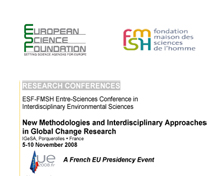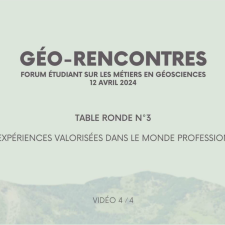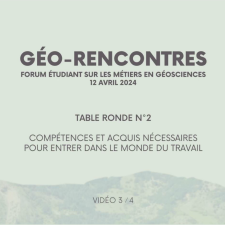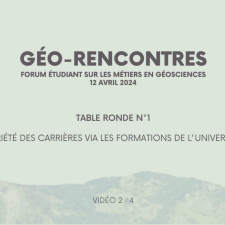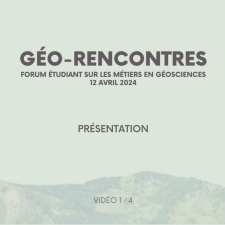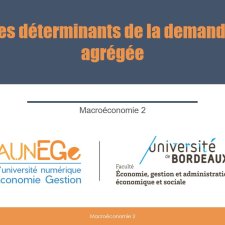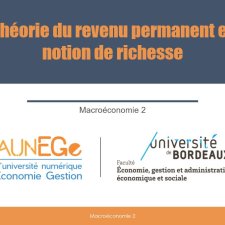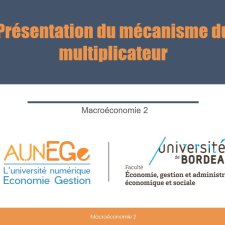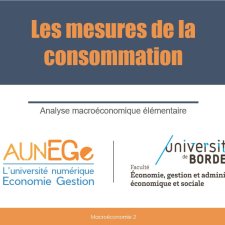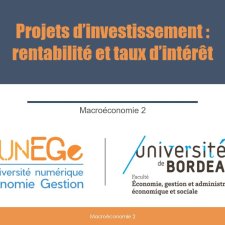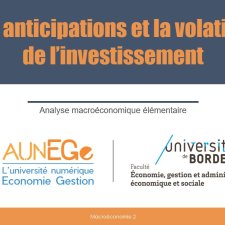Chapitres
Notice
Cross-Disciplinary International Research on Land-Atmosphere Interactions
- document 1 document 2 document 3
- niveau 1 niveau 2 niveau 3
Descriptif
The presentation will focus on scientific issues of importance to global change and climate change research: interactions of reactive trace and greenhouse gases between the biosphere and atmosphere in combination with boundary layer processes, importance of land use and land cover for climate studies, and aerosol-cloud-precipitation-climate interactions. These issues are of vital importance and research is carried out under the auspices of the multi- and cross-disciplinary Integrated Land Ecosystem-Atmosphere 81 Processes Study (iLEAPS), a core project of the International Geosphere- Biosphere Programme (IGBP) in collaboration with other international research organizations. The interactions between the biosphere and the atmosphere mediated by the production and emission of reactive trace gases are crucial and central components of the study of the Earth system and life science. Their importance to the structure and functioning of terrestrial ecosystems and to chemical weather of Earth is only now beginning to be appreciated, and there is wide acknowledgement that these are areas needing concerted scientific effort on a large scale. The current knowledge of the relation between physical and chemical processes and their impact on the larger spatial and temporal scale distribution of atmospheric compounds requires combination of knowledge of sources and sinks of atmospheric compounds, boundary layer processes: mixing, dispersion and exchange with free troposphere. This requires implementation of surface and boundary layer models in air quality and atmospheric chemistry-transport models. Recent studies suggest that the increased aerosol loading may have changed the energy balance in the atmosphere and at the Earth’s surface and altered the global water cycle in ways that make the climate system more prone to precipitation extremes. As yet, we do not fully understand how the aerosol affects the development of precipitation, nor the extent to which it affects the cycles of water and radiant energy in the climate system as a whole. Achieving better understanding on the scientific issues briefly described above is not only a major scientific challenge, but is also important to policy makers and stakeholders for making decisions on adaptation and mitigation strategies.
Intervention / Responsable scientifique
Dans la même collection
-
Climate Models: learning from the Past Long-Term Climate Variability
JoussaumeSylvieProjections of future climate change rely on global climate models. Such models simulate the dynamics and physics of the coupled atmosphere-ocean system and move towards models of the full Earth
-
Are European Ecosystems Vulnerable to Climate Change
CramerWolfgangThe relatively simple question posed by this title turns out to be complicated in its implementation, for a number of reasons: First, ecosystems have changed in response to changing climate throughout
-
The Impacts of Climate Change on Continental Ecosystems
SeguinBernardClimate change will deeply modify the ecophysiological functioningof plants, by creating a set of conditions which could be more favourable (in the sense of biomass production) or not. Among the first
-
The Economics of the Climate/Development of the Gordian Knot; Beyond a Sound Pessimism
HourcadeJean-CharlesWe will first suggest that costs of meeting ambitious climate targets capable to stabilize global warming below 2°C or 3°C temperature increase have been underestimated so far. The first reason is the
-
Debate
CallonecGaëlDupuisJohannThoronSylvieThe European Science Foundation (ESF) and the French Foundation of the Maison des Sciences de l’Homme (FMSH) (within the Entre-Sciences programme) have agreed to jointly develop a new conference
-
IPCC Working Group I and III
JoussaumeSylvieThe European Science Foundation (ESF) and the French Foundation of the Maison des Sciences de l’Homme (FMSH) (within the Entre-Sciences programme) have agreed to jointly develop a new conference
-
Global Climate Change: Past and Future
MannMichael E.My presentation will begin with a review of the now-solid evidence for a human influence on the climate of recent decades. Such evidence includes instrumental measurements available for the past two
-
Detection and Attribution of Climate Change to Different Causes
PlantonSergeAccording to the last IPCC report, the most part of the observed increase in globally averaged temperatures since the mid-20th century is very likely due to the observed increase in anthropogenic
-
Setting Cumulative Emissions Targets to Reduce the Risk of "Dangerous" Climate Change
ZickfeldKirstenThe ultimate objective of climate change mitigation is to reduce the amount of anthropogenic greenhouse gas (GHG) emissions in order to achieve “stabilization of greenhouse gas concentrations in the
-
Debate
CiaisPhilippeSeguinBernardChauvinDominiqueThe European Science Foundation (ESF) and the French Foundation of the Maison des Sciences de l’Homme (FMSH) (within the Entre-Sciences programme) have agreed to jointly develop a new conference
-
The Intergovernmental Panel on Climate Change and the Challenges of Climate policy, Equity and Ethi…
SomervilleRichardThe 2007 Intergovernmental Panel on Climate Change (IPCC) report provides clear guidance for the greenhouse gas emissions reductions needed to limit global warming to specific targets such as 2 °C
-
The Costs of Strategic Adaptation in a Simple Conceptual of Climate Change
MillnerAntonyA simple theoretical model of the process of strategic adaptation to climate change is proposed. Climate change is represented by a non-stationary Markov process on the space of climate states, and
Avec les mêmes intervenants et intervenantes
-
Debate
JoussaumeSylviePlantonSergeGonzales RoucoJesus FelipeGoosseHughesReissellAnniBrasseurGuyThe European Science Foundation (ESF) and the French Foundation of the Maison des Sciences de l’Homme (FMSH) (within the Entre-Sciences programme) have agreed to jointly develop a new conference
Sur le même thème
-
Géo-Rencontres 2024 / Les expériences valorisées dans le monde professionnel
LilloEmmaAraujoJulieHuartFlorianDubreuRomainBuquetDamienChazalLauraBorieMarianeForum sur les métiers en géosciences organisé par les étudiants du CMI Ingénierie Géologique et Civile, Université de Bordeaux, 12 avril 2024
-
Géo-Rencontres 2024 / Compétences et acquis nécessaires pour entrer dans le monde du travail
BrinonJulietteAmoleFili-FenuaPretouFrédéricCampetHugoLiébauxAlbinDe AlemeidaMarie-LouPoirierAymericDufrenoyAudreyForum sur les métiers en géosciences organisé par les étudiants du CMI Ingénierie Géologique et Civile, Université de Bordeaux, 12 avril 2024
-
Géo-Rencontres 2024 / Variété des carrières via les formations de l'université
InguimbertDianeLacazeRomaneLemaitreLaurieChazalLauraMontjeanPascalPoudevigneJacquesPortefaixFrédéricForum sur les métiers en géosciences organisé par les étudiants du CMI Ingénierie Géologique et Civile, Université de Bordeaux, 12 avril 2024
-
Géo-Rencontres 2024 / Présentation
LatasteJean-FrançoisLavieThéoForum sur les métiers en géosciences organisé par les étudiants du CMI Ingénierie Géologique et Civile, Université de Bordeaux, 12 avril 2024
-
Tokyo, plus grande « ville » au monde : aménager et gouverner la démesure
Languillon-AusselRaphaëlAvec ses quelques trente-cinq millions d’habitants, Tokyo est la « ville » la plus peuplée au monde, et l’une des métropoles les plus riches. Cette présentation vise à décrire, analyser et expliquer,
-
-
Les déterminants de la demande agrégée
Maveyraud-TricoireSamuelLes déterminants de la demande agrégée
-
La théorie du revenu permanent et la notion de richesse
Maveyraud-TricoireSamuelLa théorie du revenu permanent et la notion de richesse
-
Présentation du mécanisme du multiplicateur
Maveyraud-TricoireSamuelPrésentation du mécanisme du multiplicateur
-
-
Projet d'investissement : rentabilité et taux d'intérêt
Maveyraud-TricoireSamuelProjet d'investissement : rentabilité et taux d'intérêt
-
Les anticipations et la volatilité de l'investissement
Maveyraud-TricoireSamuelles anticipations et la volatilité de l'investissement


